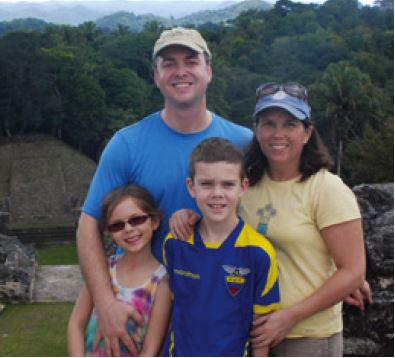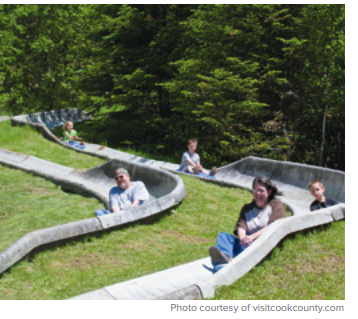Travel is often thought of as a leisurely activity, a luxury that doesn’t fit easily into family life.
When you’re caught up in the challenges of parenting, a run to Target may feel like the most ambitious trip you can manage. But if you want travel to be a part of your children’s lives, you can’t leave it to chance. You’ll end up holding your bucket list of unchecked destinations as you send your teens off to college. In other words, you have to make it a priority.
But how?
One Minnesota company, Pique Travel Design of Excelsior, is urging families to plan family travel, not a year or two out, but 5, 10, 15, even 20 years ahead.
Jim and Linda Bendt of Pique Travel Design in Excelsior believe successful travel planning — much like home buying, saving for college and planning for retirement — requires taking a long view.
Creating a wanderlist
Pique encourages long-range travel planning to help families match their interests to the experiences they seek.
They help families make those far-off “someday” destinations attainable.
Family members take individual surveys in private, so as not to be swayed by outside (read: parental) influences.
The result is a Wanderlist Travel Portfolio Plan — a wanderlust meets bucket-list concept.
Pique’s survey measures interests and brings together travel goals for the family as far as 20 years down the road. It takes the kids’ ages and family’s life stages into account.
“We see families planning for different types of trips when their kids are ages 0-5, 5-10, 10-13, 13 through high-school graduation and even when the kids are in college. Your kids are going to be ready for completely different experiences based on their age and interest, so planning accordingly allows your family to take trips at ages and life phases that are ideal for everyone’s enjoyment.”
Global citizens
Does that sound way too planful for your tastes? Too lacking in spontaneity for you?
The truth is, travel doesn’t just happen. The finances and the logistics are just too complex to handle without an intentional effort.
But long-range family travel planning isn’t just about scheduling and money management, it can be a pathway to global citizenship.
That’s according to Virtuoso, a travel network of more than 350 travel agencies with corporate offices in New York, Fort Worth and Seattle.
“Travel creates those incredible moments that allow families to bond, and it serves as a flashpoint for family values,” said Misty Ewing Belles, Virtuoso’s director of global public relations. “The concept is similar to financial planning in that you work with a trusted and knowledgeable advisor to create a strategy, only this one is based on the desire to make children citizens of the world.”
Ewing Belles said parents can tell their children about the world, but it’s far better to let them see it for themselves.
“Experiencing other people and countries also provides children with an advantage when it comes time to enter the workforce, as they understand global interdependency and cultural differences on another level,” she said. “Travel is an education like none other.”
Jim and Linda Bendt of Chanhassen and their son, Andrew, 12, and daughter, Abby, 9, take in a view atop a Maya ruin in Belize.
Making travel relevant
Overlapping your child’s or your interests in what they’re learning in school, cultures, languages or sports is also more possible with planning.
For example, if your sixth-grader will be spending three months on the structure of government and politics next spring, you could plan a trip to Washington, D.C., on the heels of that coursework.
Planning early stirs their interest while they’re studying related topics, builds anticipation for your trip, reinforces classroom learning and, ultimately, provides you with a great tour guide.
O’Reilly said travel has definitely helped enhance her kids’ learning.
“While in Kauai, we visited volcanoes, and my son, because of his recent study in school, told us everything we wanted to know about cone volcanoes,” she said. “You could see this connection go off.”
You can also tap into your family’s interests and celebrate accomplishments through travel: Your son’s been into soccer since age 3 and in a Spanish immersion school since age 5. He’ll be turning 16 around the time the 2016 Olympics are held in Rio, Brazil. Why not go?
With the rise of immersion schools including Mandarin, Spanish and French, language skills are more engrained in our children, providing even more inspiration for travel and opportunities for them to use their speaking and leadership skills.
When the language barrier is removed, it allows a full experience of another culture and develops empathy and understanding in our children.
Anticipation
Another benefit of planning is heightened anticipation leading up to the trip. It’s just like working up to reaching a long-term goal.
You know that post-trip hangover experience? Those blues are magnified when you come back from a warm-weather destination to harsh winter weather conditions. You had such a great time, you’re now incessantly dreaming and scheming about how to move to Hawaii. These feelings can put a damper on your trip.
Long-term traveling planning can help combat those feelings, said Jim Bendt of Pique. For example, reading a book about your next trip destination while on your current vacation or on the plane ride home, can ease the stressful feelings of re-entry into what can feel like a mundane existence, especially after high-adventure travel.
Destinations, companions
Do you take the same trips every year? With thought and planning, you have the power to change your course and visit locations unexplored by anyone in your family. If you plan ahead, you can let Grandma and Grandpa know a few years out that you won’t be joining them in Florida over winter break. Maybe they want to meet up with you at your international destination?
With a growing number baby boomers retiring, many grandparents are enjoying more freedom, making multigenerational travel a hot trend.
This type of travel has been a top trend for more than five years now, said Virtuoso’s Ewing Belles. In 2014, half of the network’s clients were planning multigenerational family trips. And those trips typically require even more planning because multiple families and budgets are involved.
Preparation
Life is busy, and when you haphazardly plan trips, a few undesirable things can happen: You can get locked into many re-dos of the same destination or experience, or you might find you’ve become a slave to your kids’ daycare or school breaks and your limited work vacation windows.
Families who plan can integrate travel into their lives, rather than cramming it into their tight family schedules at the last minute. Linda Bendt with Pique Travel Design said, “If you make travel a priority, schedules at school and work can bend to revolve around travel, not the other way around.”
Travel-planning mindfulness can cause you to be more intentional about things you do between trips to prepare for vacations, too.
Register for that semester-long German class at your community college and Prost-away at the Hofbrauhaus during Oktoberfest.
Sign up for that snorkeling session — yes, they do teach snorkeling in the Twin Cities, see marthaburns.com — leading up to your Cozumel vacation.
Dan and Val O’Reilly of Minnetonka and their son, 14, and daughter, 11 started traveling when the kids were young, beginning with camping trips in Northern Minnesota.
Dan and Val O’Reilly of Minnetonka traveled with their son, Colin, 14, and daughter, Meghan, 11, to The Galapagos Islands.
“Because we’ve included them and broadened our travels over the years, they’re always prepared for what’s next and they’re active participants in the planning,” Val O’Reilly said.
The O’Reillys worked with Pique to set their long-term travel agenda to maximize their budget, time and their desire to see the sights, but also relax and recharge.
“The advance travel planning process has cued us into how to seize the right timing for trips,” O’Reilly said. “We’re currently planning a family trip to Alaska based on our love of hiking, camping and the great outdoors. We also intentionally put our African safari on hold until after the kids graduate because we found that it was more of a top destination that only my husband and I share.”
Saving money, multitasking
Using the expertise of people in the travel-planning business has its perks. They know how to maximize your budget. For example, cruise lines know they have you hooked when you’re experiencing the lull of the Mediterranean Sea under the stars.
They offer discounts if you book upcoming travel while you’re on your cruise.
With no long-term plan or budget in place for this, you wouldn’t be able to take advantage of such a deal. However, through planning, you anticipate this and be ready to book your Grecian tour three years out on the spot and save 10 percent.
All of this is now possible because your dates and destination are discussed and agreed upon by the family.
Planning and plotting out destinations as a family can also call out travel pairings you might not have considered. Your son wants to see Glacier National Park and your daughter wants to explore Canada? Rather than two separate shorter trips, you might find efficiencies in planning a longer trip to combined destinations.
Also, remember: Not every family member’s travel interests are going to align perfectly. That’s why timing, age appropriateness and balance in travel type are so critical.
If your family trip out east involves visiting some ballparks on behalf of father and son, mother and daughter should also be able to visit historical sites and museums. Setting expectations and balance allows everyone to join in a new experience they may be hesitant about, knowing that their top activity of choice is on the horizon.

Family bonding
Last but not least, family time is one of the most important benefits of long-range travel planning.
Bonding during our day-to-day lives isn’t easy. We’re rushed and our schedules are hectic. Our priorities shift.
Bonding can often happen much more easily when we’re in a traveling mindset, when we’re geared up for sharing new experiences together.
No matter whom you’re with or where you go, your memories created through travel will last a lifetime.
Jennifer Gilhoi is the owner of SparkTrack, a communications consulting firm in Minneapolis.

























